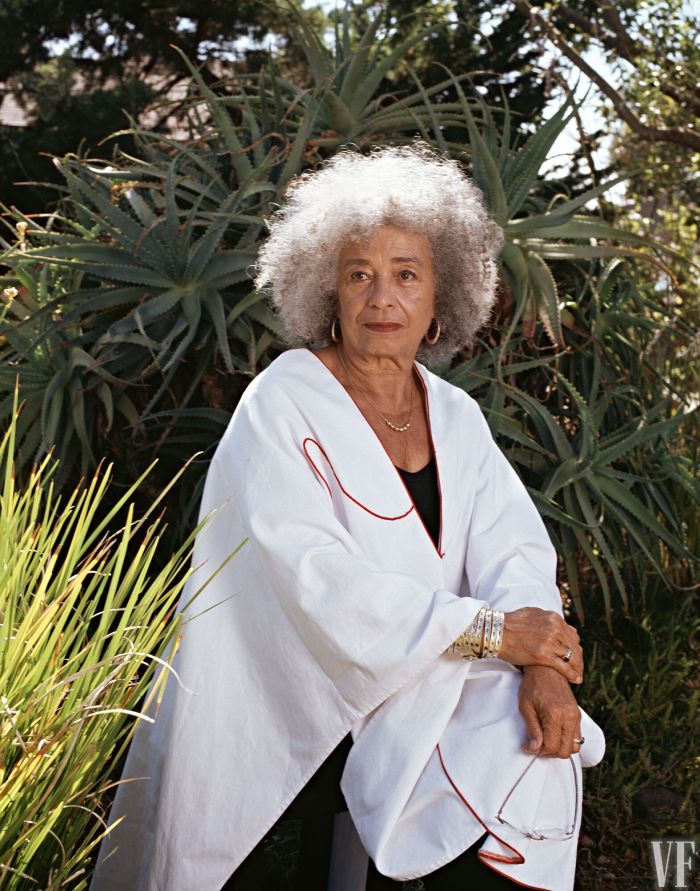
Source: Deana Lawson / Vanity Fair
Angela Davis is dropping BARS in the September issue of Vanity Fair. The same September issue that Ta-Nahesi Coates guest edited. The same September issue with Breonna Taylor on the cover in a portrait by Amy Sherald. And Davis was interviewed for the publication by none other than director Ava DuVernay herself. Talk about the power of black women.
Vanity Fair’s interview touches on everything from the COVID crisis, to prison reform, to capitalism. Check out a few key excerpts below:
AVA DuVERNAY: Do you feel that we could have encountered this moment in as robust a manner as we’ve felt it this summer without the COVID crisis having been the foundation? Could one have occurred with this much force without the other?
ANGELA DAVIS: This moment is a conjuncture between the COVID-19 crisis and the increasing awareness of the structural nature of racism. Moments like this do arise. They’re totally unpredictable, and we cannot base our organizing on the idea that we can usher in such a moment. What we can do is take advantage of the moment. When George Floyd was lynched, and we were all witnesses to that—we all watched as this white policeman held his knee on George Floyd’s neck for eight minutes and 46 seconds—I think that many people of all racial and ethnic backgrounds, who had not necessarily understood the way in which history is present in our lives today, who had said, “Well, I never owned slaves, so what does slavery have to do with me?” suddenly began to get it. That there was work that should have happened in the immediate aftermath of slavery that could have prevented us from arriving at this moment. But it did not happen. And here we are. And now we have to begin.
The protests offered people an opportunity to join in this collective demand to bring about deep change, radical change. Defund the police, abolish policing as we know it now. These are the same arguments that we’ve been making for such a long time about the prison system and the whole criminal justice system. It was as if all of these decades of work by so many people, who received no credit at all, came to fruition.
Ava Duvernay: There is a lot of talk about the symbols of slavery, of colonialism. Statues being taken down, bridges being renamed, buildings being renamed. Does it feel like performance, or do you think that there’s substance to these actions?
Angela Davis: I don’t think there’s a simple answer. It is important to point to the material manifestations of the history that we are grappling with now. And those statues are our reminders that the history of the United States of America is a history of racism. So it’s natural that people would try to bring down those symbols.
If it’s true that names are being changed, statues are being removed, it should also be true that the institutions are looking inward and figuring out how to radically transform themselves. That’s the real work. Sometimes we assume the most important work is the dramatic work—the street demonstrations. I like the term that John Berger used: Demonstrations are “rehearsals for revolution.” When we come together with so many people, we become aware of our capacity to bring about change. But it’s rare that the actual demonstration itself brings about the change. We have to work in other ways.
One of the things that you’ve talked about that I hold on to is about diversity and inclusion. In many industries, especially the entertainment industry where I work, those are buzzwords. But I see them in the way that you taught me during our conversation for 13th. These are reform tactics, not change tactics. The diversity and inclusion office of the studio, of the university, of whatever organization, is not the quick fix.
Absolutely. Virtually every institution seized upon that term, “diversity.” And I always ask, “Well, where is justice here?” Are you simply going to ask those who have been marginalized or subjugated to come inside of the institution and participate in the same process that led precisely to their marginalization? Diversity and inclusion without substantive change, without radical change, accomplishes nothing.
“Justice” is the key word. How do we begin to transform the institutions themselves? How do we change this society? We don’t want to be participants in the exploitation of capitalism. We don’t want to be participants in the marginalization of immigrants. And so there has to be a way to think about the connection among all of these issues and how we can begin to imagine a very different kind of society. That is what “defund the police” means. That is what “abolish the police” means.
This question and answer is to us one of the most important, because we are seeing a lot of gestures like the creation of more diversity and inclusion jobs — but Davis is absolutely correct that more work has to be done.
We loved this conversation so much. Two of the most important women to our culture! You can read the full interview HERE.











Comments
Bossip Comment Policy
Please read our Comment Policy before commenting.